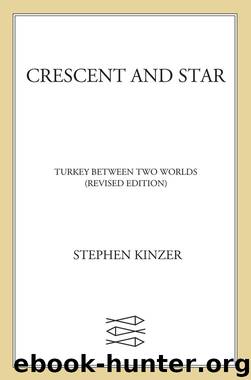Crescent and Star by Stephen Kinzer

Author:Stephen Kinzer
Language: eng
Format: epub, mobi
Publisher: Farrar, Straus and Giroux
Published: 2011-02-14T05:00:00+00:00
The greater question of how to resolve the conflict between Turkish and Kurdish nationalism, however, remains unanswered. In the summer of 2005, when Prime Minister Erdoan flew to Diyarbakir to deliver a speech about Kurdish issues, he was shocking in his candor about this intractable problem. He promised to “resolve every issue with more democracy,” and he spoke words unlike those any Turkish leader had ever uttered.
“A great and powerful nation must have the confidence to face itself, recognize the mistakes and sins of the past, and march confidently into the future,” he said. “The Kurdish issue does not belong to a part of our nation, but to us all. It is also my problem … We accept it as real and are ready to face it … We are ready to listen to anyone who has something to say, and ready to consult anyone who has a sense of justice … Turkey will not retreat from the point we have reached. We will not step back from our process of democratization.”
Erdoan’s speech, especially his use of the word “sins” to describe aspects of the state’s policy toward Kurds, provoked howls of protest from Turkish nationalists. But many Kurds were thrilled. Some began to sense that a new era might be dawning. Eager to see if it was, I set out on an extended tour of Turkey’s southeastern provinces.
In the bad old days of the 1990s, I remembered, security at the Diyarbakir airport was so tight that arriving foreigners were routinely pulled aside, questioned about the purpose of their visit, and often, if their answers were not satisfying, ordered back onto the plane. When I arrived in late 2005, fighter jets were still parked on the military side of the airport, but we civilians were free to disembark without controls and to go our own ways.
The city also felt different. Gone were the knots of armed soldiers and plainclothes police officers who used to watch everything and everyone. Tanks no longer stood menacingly on downtown street corners. People did not seem exactly happy—that was not possible in a place where 60 percent of the population was unemployed and nearly every family had a relative in prison, recently released from prison or in the mountains with the PKK—but they were not utterly hopeless.
Under a great tent that had been erected in one of Diyarbakir’s main plazas, a book fair was under way. I had never known of such an event being held in the Kurdish region and stepped eagerly inside. At the first stand I visited, wedged between Turkish translations of War and Peace and For Whom the Bell Tolls, I found a selection of books with titles like History of Kurdistan and Turkey’s Kurdish Problem. No such books could possibly have been sold here during the 1990s, when the very word “Kurdistan” was taboo and the term “Kurdish problem” was taken to refer to an illegal form of separatism.
“Before, we were afraid to speak out,” a Kurdish writer named Lutfi Baski told me at the fair.
Download
This site does not store any files on its server. We only index and link to content provided by other sites. Please contact the content providers to delete copyright contents if any and email us, we'll remove relevant links or contents immediately.
| Africa | Americas |
| Arctic & Antarctica | Asia |
| Australia & Oceania | Europe |
| Middle East | Russia |
| United States | World |
| Ancient Civilizations | Military |
| Historical Study & Educational Resources |
Empire of the Sikhs by Patwant Singh(23078)
The Wind in My Hair by Masih Alinejad(5092)
Rise and Kill First by Ronen Bergman(4781)
The Templars by Dan Jones(4685)
The Rape of Nanking by Iris Chang(4205)
12 Strong by Doug Stanton(3542)
Blood and Sand by Alex Von Tunzelmann(3198)
Babylon's Ark by Lawrence Anthony(2674)
The History of Jihad: From Muhammad to ISIS by Spencer Robert(2622)
No Room for Small Dreams by Shimon Peres(2366)
The Turkish Psychedelic Explosion by Daniel Spicer(2355)
Inside the Middle East by Avi Melamed(2352)
Gideon's Spies: The Secret History of the Mossad by Gordon Thomas(2346)
Arabs by Eugene Rogan(2292)
The First Muslim The Story of Muhammad by Lesley Hazleton(2268)
Come, Tell Me How You Live by Mallowan Agatha Christie(2257)
Bus on Jaffa Road by Mike Kelly(2150)
Kabul 1841-42: Battle Story by Edmund Yorke(2025)
1453 by Roger Crowley(2024)
